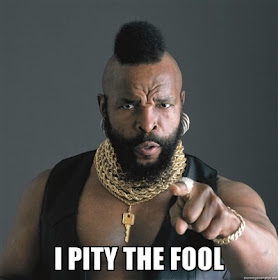 |
| "Timmy, come away from that cliff!" "Shhh, Balthasar. What cliff?" (Source) |
When we hear the word "fool" in the modern day, we might think of Mr. T, or some old crotchety grandparent saying, "don't be foolish". It's not a word that gets much usage. "Foolish" is a synonym for "stupid"--a person who just doesn't know any better. There are actually a few Hebrew words translated into the English "fool". A quick scan of the Strong's Concordance revealed these: 1, 2, 3, 4. The first definition and usage is the most fully-formed, meaning, "one who despises wisdom, who mocks when guilty, who is quarrelsome, who is licentious". A Biblical "fool" is more active than an English "fool". A Biblical fool tries harder to be foolish, is knowingly and stubbornly in the state of "fool". Keep that difference in mind as we continue.
 |
| This sentiment is more for modern fools, who can't help it (Source) |
That being said, let's dive into what fools are said to do.
- The way of a fool is right in his own eyes: but he that hearkens unto counsel is wise. (Proverbs 12:15)
- A fool despises his father's instruction: but he that regards reproof is prudent. (Proverbs 15:5)
- A scorner loves not one that reproves him: neither will he go unto the wise. (Proverbs 15:12)
- A reproof enters more into a wise man than an hundred stripes into a fool. (Proverbs 17:10)
- He that begets a fool does it to his sorrow: and the father of a fool hath no joy. (Proverbs 17:21)
- A foolish son is a grief to his father, and bitterness to her that bare him. (Proverbs 17:25)
- Speak not in the ears of a fool: for he will despise the wisdom of thy words. (Proverbs 23:9)
- Be not among winebibbers; among riotous eaters of flesh: For the drunkard and the glutton shall come to poverty: and drowsiness shall clothe a man with rags. Hearken unto thy father that begat thee, and despise not thy mother when she is old. (Proverbs 23:20-22)
- Whoso keeps the law is a wise son: but he that is a companion of riotous men shames his father. (Proverbs 28:7)
- He that trusts in his own heart is a fool: but whoso walks wisely, he shall be delivered. (Proverbs 28:26)
- The legs of the lame are not equal: so is a parable in the mouth of fools. (Proverbs 26:7)
- A whip for the horse, a bridle for the ass, and a rod for the fool's back. (Proverbs 26:3)
- Answer a fool as his folly deserves, lest he be wise in his own eyes. (Proverbs 26:5)
- Let a bear robbed of her whelps meet a man, rather than a fool in his folly. (Proverbs 17:12)
As Proverbs tells us, and as Solomon was no doubt intimately aware, there isn't much to do. You can beat a fool, but as Proverbs 17:10 tells us, the lesson will not sink in. We are to rebuke a fool as deserved, but according to Proverbs 23:9, the fool will not listen. This leads us to the last verse on the list, Proverbs 17:12. Because of the thorny problem fools present, it's better to be attacked by an angry bear than to meet one.
 |
| This photographer gets to meet both at once! (Source) |
Conclusion
What makes fools a tricky topic is the lack of clear guidelines. Repentant sinners should be forgiven; enemies should be cared for; friends, supported and assisted. The required instruction and punishment of fools doesn't do much good, so the best recourse, like when meeting an angry bear, seems to be to run far, far away. If you meet with a fool, I wish you godspeed. If you are the fool, I wish you luck in seeking wisdom.
No comments:
Post a Comment